Can the food we eat effect anxiety?
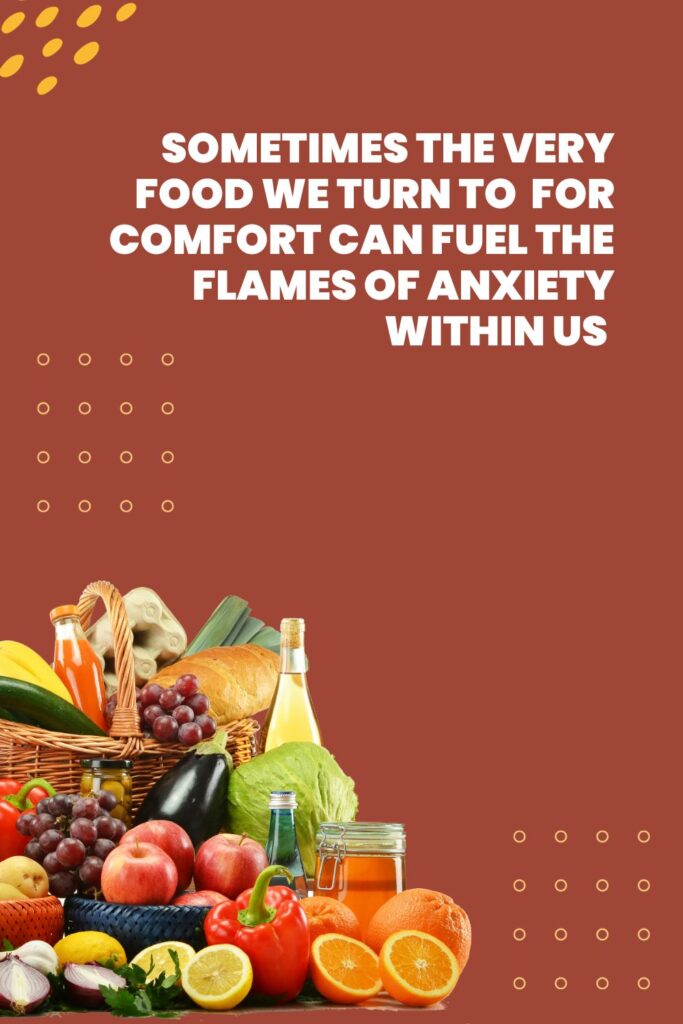
Honestly, I have no idea as I start this bog as to what the answer is , I like it that way .. I come up with an idea and see where it takes me ..that way I never let my personal bias dictate the outcome , Ive just noticed that Ive missed a question mark in the above picture ….oh its too late now , just pretend its there …anyways back to the question .
Is it possible to make a sort of nutritional intervention?
Well a paper written in 2021 and part of a bigger project ‘Mechanisms Underlying Food Disorders’ asks that very question ( handy ). Written by Nicholas Norwitz PhD( Oxford , Anatomy and Genetics) , currently a Medical student at Harvard and Uma Naidoo currently an Assistant Professor also at Harvard.
Concentrating on our old friend the microbiome and inflammation, as the main influencers of mental illness and anxiety They looked at six specific nutritional interventions adding vitamin D ( doesn’t say what form the vitamin used was , yet ) , taking up a ketogenic diet , adding more omega-3 fatty acids ,adding Turmeric and on the negative side removing artificial sweeteners and gluten . This is a very interesting selection ,some of which I wouldn’t have considered , like gluten for example , but let’s see where it leads us.
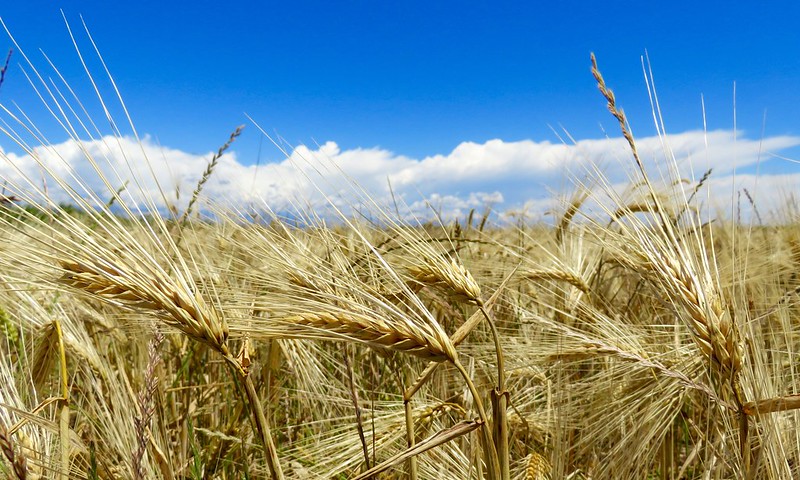
The writers acknowledge that Nutritional Psychiatry is in its infancy and as such this paper should be seen as a place to start the discussion , not a comprehensive answer. This is though an important area to look at , Roy-byrne P. et al ( 2015) Treatment-refractory anxiety ( I have just published a post on this , resistant anxiety ) ,risk factors shows that one third of US citizens will suffer from some form of anxiety and only a quarter of these are fully recovered by treatment. The writers go on to partially blame lifestyle factors for onset of some neurological conditions . They talk about this leading to oxidative stress ( the imbalance between the production of free radicals and the ability of the body to counteract their harmful effects). They also cite , insulin resistance , inflammation and Microbiome Dysbiosis ( changes in the microbiota leading to disease). Nutrition they state, is just one part of metabolic medicine and although new , I have seen and perhaps you have too , many YouTube videos and Pinterest posts on this very subject.

Microbiome
We have talked a lot in previous posts about the importance of the Microbiome , the largest endocrine organ with trillions of microorganisms living within it . I threw a bit of cheese out today as it had a bit of mould on the end of it ………seems a bit silly now I think about it . We have seen that the vagus nerve (tenth cranial nerve , consists of two nerves , left and right , controls the heart , lungs and digestive tract). We have seen that the state of the microbiome can influence our moods , anxiety through the gut -brain axis, I feel we are all going to hear a lot about this over the next few years …
This paper by Norwitz however looks at the effects of he structure in the brain that is a large player in the threat response , the Amygdala , he cites research to show that the microbiome influences the amygdala ( Asnicar et al 2021, Microbiome connections with host metabolism and habitual diet…), through receptors for gut peptides. Short chain fatty acids , can also influence the brain through other mechanisms such as the immune system , inflammatory and other endocrine mechanisms . The paper mentioned that anxiety has been found to cause anxiety from gram negative bacteria leaking through the gut barrier ( this type of bacteria is named Gram , due to its action of not retaining the ‘stain’ during the gram staining method , this bacteria is found in all environments ). Norwitz does remind us that the gut brain axis is two way , a bidirectional relationship, negative emotions can effect the microbiome .
He points to the importance of inflammation in anxiety sufferers , he shows research ( feller JC 1028 ) the shows suffers from severe anxiety disorders exhibit elevated levels of inflammatory markers. The effect of these cytokines ( small proteins used in cell signalling ) causes neurotransmitter imbalances in the brain ( he uses serotonin , dopamine and GABA glutamate as examples) this negatively impacts on the amygdala . A study quoted ( Vieira, Ferreira, Pacheco , Barrow, Almmeida , Araujo-Lima et al 2010) showed double Amygdala activity in those suffering with PTSD , this area of research though is ongoing and not definite. The writers do however feel that it is likely that inflammation contributes to anxiety in possibly the majority of cases.
Food causing inflammation
This is supposed to be a post about food , so we had better mention it I suppose !

The writers use SAD ( standard American Diet , not seasonal affected disorder ) to identify both refined sugars and processed vegetable oils as the leading food contributors of inflammation . These would include ( Im just putting down a chocolate brownie ..I think this is about to spoil its taste!), well anything with processed sugars in them , like cakes , biscuits , we know the rest . The processed oils would be those high in omega 6 fatty acids, such as corn oil and soybean oil ( the second most used vegetable oil). These oils are stripped of their antioxidants causing Linoleic acid ( a polyunsaturated fatty acid) and when that oxidises in the body it reaps havoc not just anxiety but , many forms of inflammatory disease throughout the whole body including the brain. The writers warn against replacing sugars with artificial sweeteners , they quote Ashok ,sheeladevi and Wankhar 2013 as proof of a link to anxiety and they further suggest a link to inflammation.
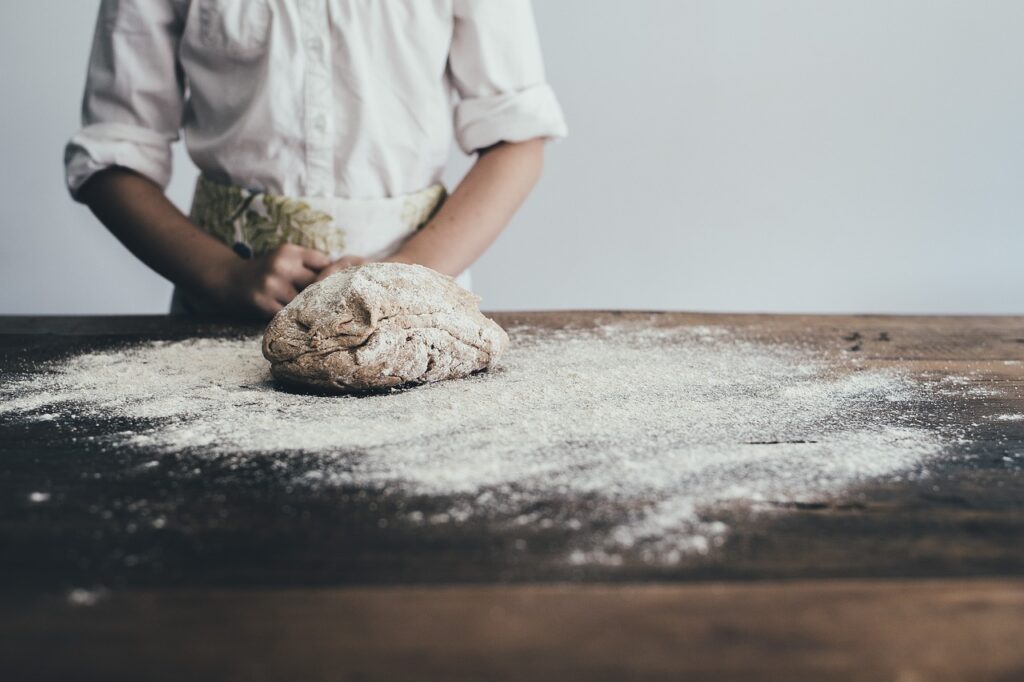
Gluten
As mentioned above , gluten is another area the paper looked at , I honestly would not have thought of looking into gluten , but here goes….
The writers blame Gluten for causing an over expression of the Zonulin protein ( sometimes called Zonulin expression ) . This protein has been linked to increased gut permeability leading to inflammation in the body . The writers state there is a link between sensitivity to gluten and patients with anxiety. Although a 2001 study only showed a reduction in anxiety in patients with Coeliac disease when avoiding gluten ( Addolorato ,Capristo ,Ghittoni ,Valeri , Masciana , Ancona et al ).
Omega-3s

We probably have all heard about Omega 3 fatty acids , In fact as a vegetarian I I’m taking this as a supplement ( Im not recommending it ). Both EPA ( eicosapentaenoic acid ) and DHA ( docosahexaenoic acid) are potent anti-inflammatories . The writers suggest evidence that shows a diet rich in omega-3 normalises dopamine , reduce anxiety behaviours and increase BDNF ( we looked at this in another post , brain derived neurotrophic factor , it provides instructions for making proteins found in the brain and spinal cord). The paper also goes on to show how in mice a diet rich in omega 3s improves microbiome balance , decreases inflammation and balances neurochemistry ( control and influence the physiology of the nervous system) . Green et al ( quoted in the paper ) showed that there is an inverse correlation between omega 3s and the severity of anxiety ( Green ,Hermesh ,Monselise , Marom , Presburger , Weizman 2006) . Harvard Health Publishing in January 2019 Showed that people who took high doses of omega 3s up to 2000 mg a day seemed tom have the most reduction in anxiety symptoms ( please don’t do this without medical advice ). The paper from Harvard suggest a lack of omega 3s in the brain may induce various behavioural and psychiatric disorders. Harvard do suggest that larger trials are required before high dose omega 3 supplements are recommended. A systematic review and Meta analysis in 2018 ( Kuan-Pin Su PhD , Ping-TaoTseng MD , Pro-Yen Lin MD PhD et Al ) looked at possible improvements in anxiety symptoms when omega 3 was given as a treatment . Involving 2240 participants from 11 countries. The main findings of this analysis was that omega 3s PUFAs ( fatty acids) were associated with a significant reduction in anxiety symptoms compared to controls. Yet there were limitations to this trial and the researchers have called for further specific trials with high dosage omega 3s .
Tumeric

Let’s get back to Norwitz paper from 2021 , Looking at a possible food intervention , he turned his attention to Tumeric . I went in a local shop last week and they were selling Tumeric shots covering a whole section , I almost bought one .
Tumeric has been linked to research in treatments for Alzheimers , Parkinson’s ,depression and anxiety . Also known as Cur-cumin it is thought that it might help the microbiome , lowering inflammation and has a positive effect on dopamine, serotonin and cortisol levels ( perhaps I should have bought one of those shots after all) ….( YinH, Goo Q , Li X Tang Li C , Wang H et al 2018 Cur-cumin suppresses 1 beta secretion and prevents inflammation ). In rats tests show a reduction in anxiety in rats where the anxiety had been artificially created prior to the test .
A 2015 study by Esmaily H, Sahebkar A , Iranshahi M , ganjali S mohammedi A , Ferns G et al , found that a group of 30 obese individuals with diabetes found a reduction in anxiety . They were treated with cur cumin supplementation for 30 days and anxiety scores were reduced. This all sounds good news , but it seldom is that easy ! Nelson et al showed that cur cumin is chemically unstable and can mess with results from trials as does possible impurity and different formulations. It is thought that Tumeric ( I’m back to calling it that ) need to be consumed with fats , some studies even employed techniques to help in the absorption of the Tumeric for example using Piperine ( a compound found in black pepper ). Norwitz also points out that , in a link to omega 3 , Tumeric is also thought to increase the availability of DHA in the brain and this may also be important when looking at research results ( increases the conversion of ALA to DHA ).
Vitimin D

I feel like my past post on vitamins has covered this , so I’ll be brief .
Vitimin D has been shown to reduce inflammation ,shape the microbiome , regulates calcium homeostasis ( state of steady) . Norwitz shows that a low level of vitamin D is linked with depression ( Maddock J ,Berry DJ , Geoffrey MC , Power C, hypponen 2013) and anxiety . It is difficult to get from diet alone , five gallons of milk a day should do it ….thats a lot of Lattes !
Vitamin D supplementation has been shown to help with anxiety but mostly when a deficiency exists , although deficiency is fairly common in northern countries . Calame W, Street L and hulshof T showed in 2020 that vitimin intake in the UK are far too low and recommended fortified food .
ketogenic diets
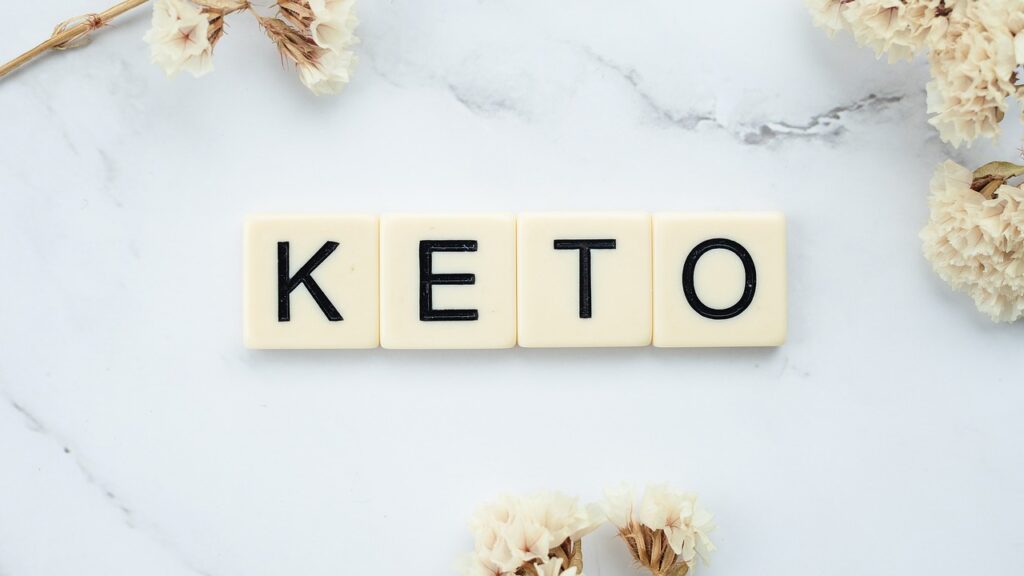
High fat low carbohydrate diets are next in Norwitz paper , not something I would have thought of …again . Ive seen so much about this on you tube , as a vegetarian its not something I’ve thought about trying .Ketones are produced by the liver during carbohydrate restriction , the paper seems to view this in a favourable light . It suggests that this is a more efficient fuel substrate ( molecule that an enzyme will act upon ). They describe it as promising treatment for neurodegenerative conditions ( Parkinson’s for example), but also ADHD , bipolar disorder , schizophrenia ,autism spectrum disorder , depressive disorder and binge eating disorder. He goes on to say that the ketones produced also improve gut barrier function and reduce oxidative stress and inflammation . Quoting studies on rats ( Ari C , Kovacs Z , Juhasz G , Murdun C ,Goldhagen CR ,and Koutnik AP in 2016 Exogenous ketone supplements reduce anxiety related behaviour in rats ) the paper suggests that a Ketogenic Diet , perhaps with intermittent fasting can be seen to reduce anxiety like behaviours, well at least in rats……
Just to step in here … Im no expert as you know so I’ll add a very recent paper by Cambridge University press April 2023 by Daniel m Ditch et al ( full details are below ) . The aim of this study was to look at the efficacy of low or very low carbohydrate diets and their effect on various neurological disorders. The researchers looked at 1377 articles and found , well , mixed results . There have not been any really robust studies into LC/KD diets , some articles they looked at suggested possible benefits but these were from uncontrolled studies . This goes to show that listening to people talking about benefits in rats does not necessarily mean that research is current in controlled trials in humans.
Anyway back to Norwitz , the paper came to a conclusion that certain foods should be considered and others avoided . One to consider is Omega 3s , Vitamin D , Turmeric and perhaps more controversially the ketogenic diet . On the foods to avoid Sugar , Processed vegetable oils , Gluten and Artificial sweetners.
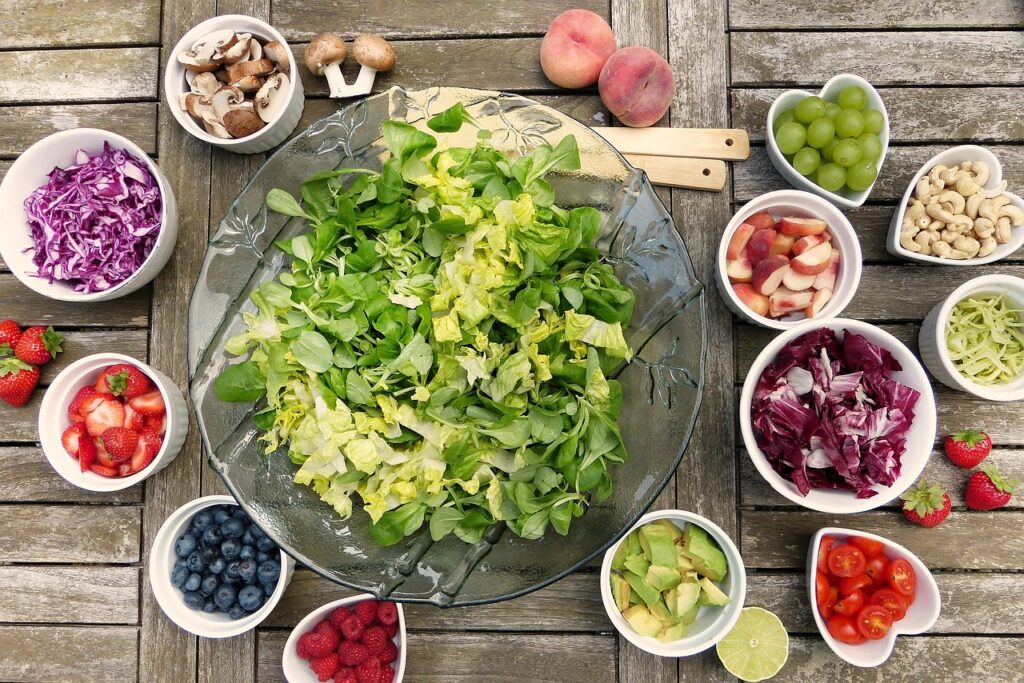
It’s been fun looking at one paper on food and anxiety , but we should realise it’s not the definitive guide . A paper in Nutrients December 2021 Aucoin M et al ( detail below )highlights the importance of nutrition in the development and progression of mental disorders. The paper is a scoping review looking at links between anxiety disorders and nutrition. intestinally they used an AI programme ( Abstrackr) to cover the very large volume of research they wished to collate, in fact it was 1541 pieces of research in total .
The conclusions found that there is evidence that certain dietary patterns may influence the development and also the progression of anxiety disorders. Probably unsurprisingly those diets with an emphasis on vegetables , fruit , limited sugar and refined grains , those closest to the Mediterranean diet were associated with lower levels of anxiety. Unfortunately some of the diets described in the research used lacked clear definitions of a healthy or unhealthy diet and interventions used, this will act to limit the conclusions of this otherwise excellent study.
For example Vegetarian or vegan diets produced positive outcomes , however the research previously undertaken and included in this scoping study was mainly gained by observation only. Some individuals only took up a vegan diet after a period of eating disorders and this made it look like there was a link between anxiety and a vegan diet , clearly this would be unusual and creates an unreliable outcome to a study.
Carbohydrates
The study did find a link between high carbohydrate intake and anxiety, even this though has to be limited by the cross sectional nature of trials used ( universal sampling ) .
Protein
Again the scoping study found possible benefits especially when looking at tryptophan ( an amino acid ) , however this are still preliminary results . Food sources of tryptophan are eggs , soy , seeds , fish and meat .
Fats
The study did find that there is significant animal and human evidence that adequate levels of omega 3 fatty acids may have an anti anxiety effect. This may be as a result of reduced inflammation in the body , possibly neurotransmission or neuroplacicity . Dietary sources of omega 3 are fish , sea food , flax and chia seeds and hemp seeds.
Vitamins
The paper suggests the importance of Micronutrients such as zinc and selenium as well as B vitamins . A good intake of oysters ( not for me !) leafy and root vegetables , meat ( Im a vegetarian so a bit hard!) , beans , lentils , Brazil nuts .
Vegetable’s
The report , again perhaps not a surprise states that fruit and plants in our diets may well have anti anxiety properties, however the main research is only on animals. Coffee seems to be beneficial as does tea and cacao .
Gut microbiome
Again , not too surprising , the report found that increasing fruits , vegetable , fibre , fermented foods seems to help the microbiome and therefore a reduction in anxiety.
Conclusion
Look , I think we are in muddy waters when we talk about anxiety and food. Just put anxiety and food into Tick Tock , YouTube or any social media and you will find thousands of people who claim that the know better than you or experts . Im not an expert , I just try to follow the science . I think we can see from the above reports that research has a long way to go to give us the answers . Food , diet and the body is just so complicated. What I have got out of this is , sort of boring , eat good food and in moderation . Personally as a vegetarian , I might have some omega 3 supplements and perhaps a vitamin D ,only within the recommended doses. I think we should try to eat a well balanced, healthy …perhaps Mediterranean diet , plenty of nuts, pulses and seeds ( unless allergic). I’ll keep an eye on the latest research , I’ll stay away from ultra processed food, some non ultra processed foods are fine for example canned beans , yogurt or Tofu . Perhaps I will reduce the junk food , except at Christmas !
In short , I don’t think we know yet but there are some areas that look good for reducing our anxiety .
Added 18/02/24
An article in the New York Times from 2023 adds a bit to the above the writer sally Wadyka states that the Average American Diet now comes from 60% Highly Processed foods . She quotes Dr Eric Hecht and epidemiologist , that over 70% of packaged food is now ultra processed . He is quoted as saying ” Ultra-processed foods are carefully formulated to be so palatable and satisfying that they are almost addictive”. He added ” There is a significant increase in mental unhealthy days for those eating 60 percent or more of their calories from UPFs “. Very importantly he cautioned ” This is not proof of a causation , but we can say that there seems to be an association “.
One point Id like to add and It was also mentioned in the above article and that is association can work both ways . Dr T.H Chan a professor of epidemiology at Harvard gave us the following advice. ” Diet does influence mood , but the reverse is also true “. ” When you get depressed , stressed or anxious you tend yo eat more unhealthy foods , in particular ultra processed foods that are high in fat , sugar and chemical Additives”.
I watched a talk the other night and the professor ( no I can’t remember who it was , it was on Youtube , I think it was on Zoe ) was saying that not all processed food is bad for us , some like canned beans , frozen vegetables , pre cooked brown rice or things like canned fish are convenient and these can be used within what they would consider a healthy diet .
Anyway , I will keep looking at my past posts and updating where I can ………
References
Published online 2021 Dec 10. doi: 10.3390/nu13124418
PMCID: PMC8706568
PMID: 34959972
Diet and Anxiety: A Scoping Review
Monique Aucoin,1,* Laura LaChance,2,3 Umadevi Naidoo,4,5 Daniella Remy,1,6 Tanisha Shekdar,1 Negin Sayar,1Valentina Cardozo,1 Tara Rawana,1 Irina Chan,1 and Kieran Cooley1,7,8,9
Roser Granero, Academic Editor, Diego Redolar Ripoll, Academic Editor, and Ina Bergheim, Academic Editor
Author information Article notes Copyright and License information PMC Disclaimer
Efficacy of low carbohydrate and ketogenic diets in treating mood and anxiety disorders: systematic review and implications for clinical practice
Daniel M Dietch 1, Jess Kerr-Gaffney 2, Meghan Hockey 3, Wolfgang Marx 3, Anu Ruusunen 4, Allan H Young 2, Michael Berk 3, Valeria Mondelli 5
Affiliations collapse
Affiliations
- 1Lonsdale Medical Centre, London, UK; and Department of Psychological Medicine, Institute of Psychiatry, Psychology & Neuroscience, King’s College London, London, UK.
- 2Department of Psychological Medicine, Institute of Psychiatry, Psychology & Neuroscience, King’s College London, London, UK.
- 3Institute for Mental and Physical Health and Clinical Translation (IMPACT), Food & Mood Centre, School of Medicine, Barwon Health, Deakin University, Geelong, Australia.
- 4Institute for Mental and Physical Health and Clinical Translation (IMPACT), Food & Mood Centre, School of Medicine, Barwon Health, Deakin University, Geelong, Australia; Department of Psychiatry, Kuopio University Hospital, Kuopio, Finland; and Institute of Public Health and Clinical Nutrition, University of Eastern Finland, Kuopio, Finland.
- 5Department of Psychological Medicine, Institute of Psychiatry, Psychology & Neuroscience, King’s College London, London, UK; and National Institute for Health Research (NIHR) Maudsley Biomedical Research Centre, South London and Maudsley NHS Foundation Trust, King’s College London, London, UK.
- PMID: 37066662
- PMCID: PMC10134254
- DOI: 10.1192/bjo.2023.36
Published online 2021 Feb 12. doi: 10.3389/fpsyt.2021.598119
PMCID: PMC7907178
PMID: 33643090
Nutrition as Metabolic Treatment for Anxiety
Nicholas G. Norwitz1,2,* and Uma Naidoo2,3
Author information Article notes Copyright and License information PMC Disclaimer
Copyright © 2021 Norwitz and Naidoo.
This is an open-access article distributed under the terms of the Creative Commons Attribution License (CC BY). The use, distribution or reproduction in other forums is permitted, provided the original author(s) and the copyright owner(s) are credited and that the original publication in this journal is cited, in accordance with accepted academic practice. No use, distribution or reproduction is permitted which does not comply with these terms.


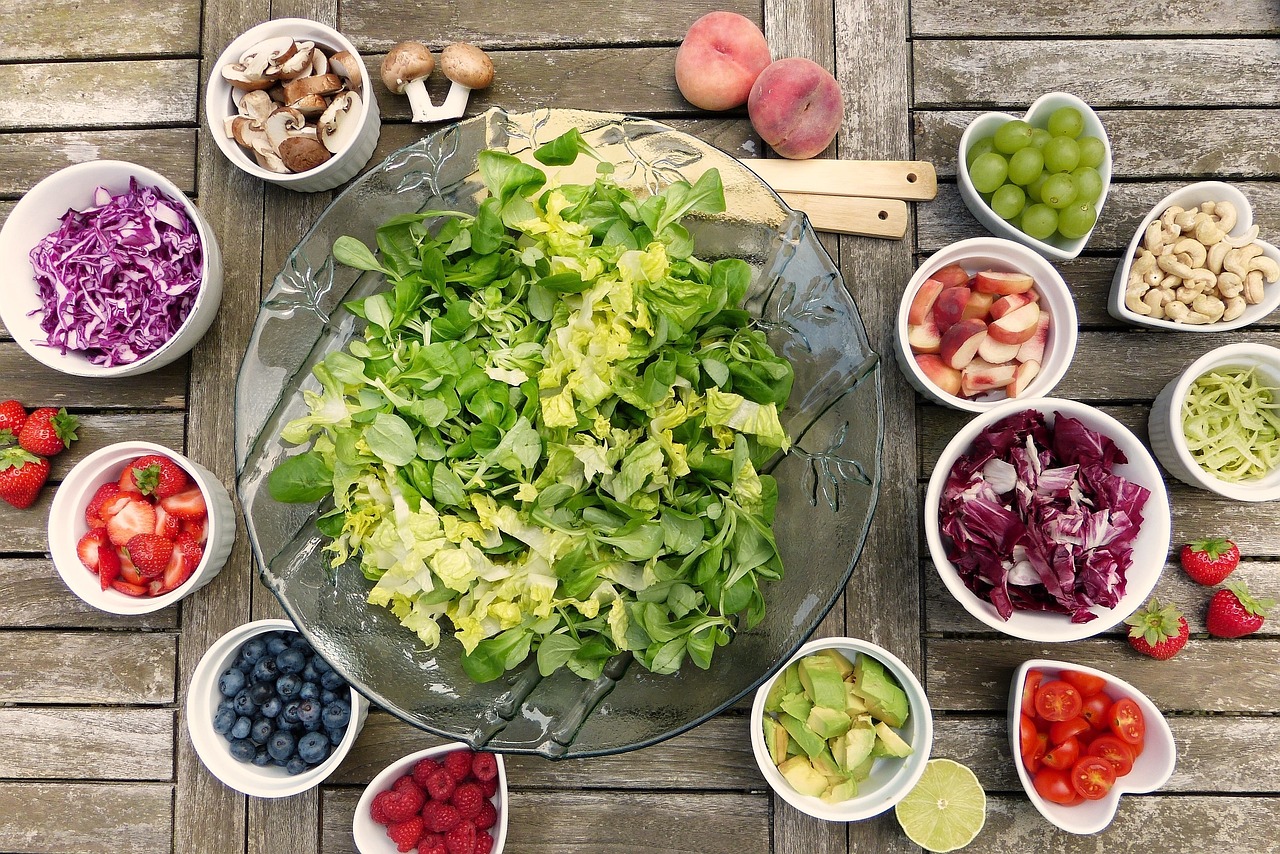






Fantastic! This is a truly amazing piece; I have gained a lot of clarity from it.
I concur with every idea you have expressed in your post; they are really well-written and will have a positive impact. But the postings are very short for newcomers; maybe you might extend them a bit in the future? I’m grateful for the post.
I am truly thankful to the owner of this web site who has shared this fantastic piece of writing at at this place.
Thanks for the great comment , I do want to say sorry though ….. I thought I had proof read that , I didn’t , so Im going to go through it now and get rid of all those nasty spelling mistakes .Trouble is Im too busy drinking coffee when I write these in coffee shops and forget….sorry again .